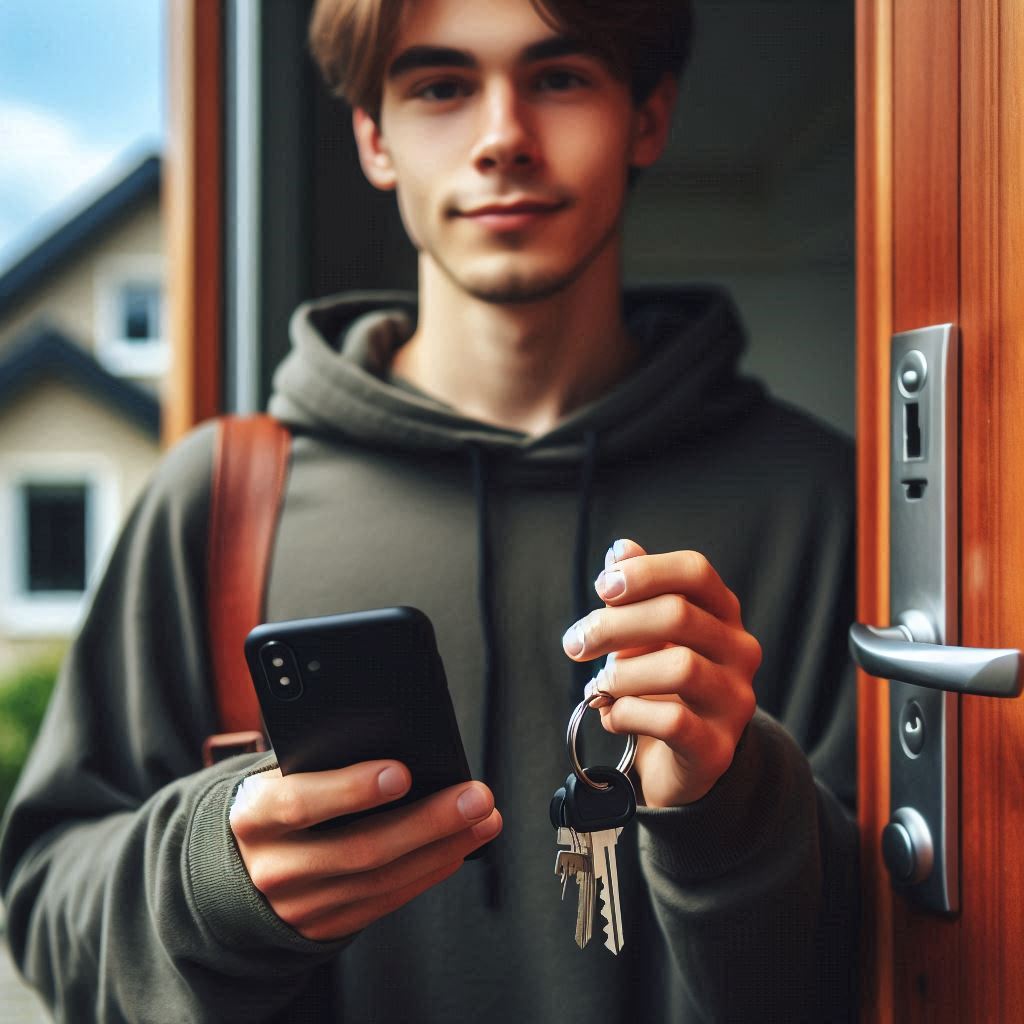Introduction
A lockout occurs when you cannot access your home, car, or business due to lost or misplaced keys.
Common scenarios include rushing out the door and forgetting your keys.
Lockouts can also happen when keys break inside locks or when children accidentally lock doors behind them.
In these situations, staying calm is essential.
Panic can cloud your judgment and lead to rash decisions.
Taking a deep breath allows you to think clearly and assess your options.
Start by checking for spare keys, which may be hidden nearby or with a trusted neighbor.
If you cannot find a spare, consider reaching out to a friend or family member for assistance.
They might be able to help you access your property.
If these options fail, it’s best to contact a professional locksmith.
They have the tools and expertise to resolve the situation quickly.
Handling lockouts effectively requires a level head and a plan.
Staying calm helps you avoid costly mistakes, like damaging locks or doors.
Remember that lockouts happen to everyone, so you’re not alone.
By staying composed, you can navigate this frustrating situation with ease and regain access to your property.
Stay Prepared
Have Spare Keys Made and Keep Them in a Safe Place
When handling lockouts, preparation is key.
Have spare keys made to avoid stressful situations in the future.
A spare key provides an immediate solution if you accidentally lock yourself out.
Keep these keys in a secure yet accessible location.
Consider using a safe that is easy to remember but difficult for intruders to find.
Avoid hiding spare keys under doormats or flower pots, as burglars often check these common hiding spots.
Instead, find a more creative location that only you and trusted individuals know about.
You can also invest in a key holder that attaches to your home’s exterior.
These holders are designed to blend in with your surroundings, making them less noticeable.
Ensure that the holder is durable and weather-resistant for long-lasting use.
Having spare keys readily available significantly reduces the chances of panic during a lockout.
You can quickly regain access to your home without waiting for assistance.
This proactive approach provides peace of mind, knowing you are prepared for unexpected situations.
Consider Giving Spare Keys to a Trusted Neighbor or Family Member
Another effective strategy is to give spare keys to a trusted neighbor or family member.
This arrangement provides a reliable backup plan if you find yourself locked out.
Choose someone who lives nearby and is willing to help in emergencies.
When selecting a keyholder, ensure this person understands the importance of keeping the key safe.
Clear communication about your expectations is essential.
Discuss when and how to use the spare key, ensuring your keyholder is comfortable with their responsibility.
Having a trusted neighbor or family member hold a spare key offers additional security.
If you ever misplace your primary key, you can quickly access your home without stress.
This backup plan is especially beneficial during late-night or early-morning lockouts.
Be sure to inform your keyholder of any changes in your schedule or any planned trips.
This communication ensures they are available if you need assistance.
Establishing a reliable support system helps alleviate anxiety during lockouts.
Utilize Keyless Entry Systems or Smart Locks for Added Convenience
To enhance convenience, consider utilizing keyless entry systems or smart locks.
These modern solutions eliminate the need for physical keys altogether.
Keyless entry systems use codes or biometric data for access, making it difficult to lock yourself out.
Smart locks connect to your smartphone, allowing you to lock and unlock your door remotely.
This feature enables you to grant access to trusted individuals without physically handing over a key.
You can also monitor entry and exit activity through an app.
When selecting a keyless entry system or smart lock, prioritize security features.
Look for options with encryption and tamper alerts to safeguard your home.
Research different brands and read customer reviews to find a reliable product.
Installing a keyless entry system or smart lock can save you time and prevent lockouts.
You no longer have to worry about losing your keys or forgetting them inside your home.
These solutions provide added convenience and peace of mind for you and your family.
In review, handling lockouts without panicking involves preparation and smart strategies.
Have spare keys made and store them safely.
Consider giving a spare key to a trusted neighbor or family member.
Finally, utilize keyless entry systems or smart locks for added convenience.
By implementing these tips, you can navigate lockouts with confidence and ease.
Read: How Much Do Pet Groomers Earn in the USA?
Keep a Spare Key in a Secure Location
Choose a Discreet and Secure Spot to Store Spare Keys
Handling lockouts can be stressful, but preparing in advance helps prevent panic.
One effective strategy is to store spare keys securely.
Choose a discreet location that only you and trusted individuals know about.
This way, you can access your spare key easily when needed.
Consider places that are not easily visible to others.
For instance, avoid leaving a key in plain sight on your porch or near entryways.
Instead, find a hidden spot that blends in with your surroundings.
Storing keys in a less obvious area adds an extra layer of security.
Another option is to give a spare key to a trusted neighbor or friend.
This arrangement provides quick access in case of a lockout.
Ensure that this person understands the importance of keeping your key safe.
Trust is crucial in this situation, so choose someone reliable.
Avoid Obvious Hiding Spots Like Under Doormats or Flower Pots
While hiding a spare key can be convenient, certain spots are too obvious.
Avoid common hiding places like under doormats or inside flower pots.
Intruders often check these spots first, making them ineffective for security.
Instead, think creatively about less obvious locations.
You might consider placing a spare key inside a fake rock or garden ornament.
Alternatively, you could hide a key in a birdhouse or another outdoor decoration.
These clever hiding spots blend in with your landscape while keeping your key safe.
Remember to periodically check your hidden spare key.
Ensure it remains functional and isn’t exposed to the elements.
A damaged key may not work during an emergency, so maintenance is key.
Consider Investing in a Lockbox for Added Security
For those who want added security, consider investing in a lockbox for spare keys.
A lockbox provides a secure way to store your spare key while keeping it accessible.
Many models allow you to set a combination, ensuring only trusted individuals can access the key.
Place the lockbox in a discreet location that only you know about.
A well-hidden lockbox provides convenience and security.
When you need access, simply enter the combination to retrieve your spare key.
Lockboxes are especially useful if you frequently have guests or service workers at your home.
You can provide them access without compromising your primary keys.
Choose a lockbox made from durable materials to withstand outdoor conditions.
In the end, handling lockouts without panicking is possible with proper preparation.
Start by choosing a discreet and secure spot to store spare keys.
Avoid obvious hiding places to enhance security.
Additionally, consider investing in a lockbox for added peace of mind.
By following these tips, you can ensure you are prepared for any lockout situation that arises.
Read: Top Pet Grooming Conferences and Expos in the USA
Contact a Trusted Friend or Family Member
Reach Out to Someone Who May Have a Spare Key
When you find yourself locked out, stay calm and assess your options.
The first step is to reach out to someone who may have a spare key.
This could be a family member, friend, or neighbor.
Having someone nearby can significantly reduce your stress during a lockout situation.
If you live with someone, check if they have a spare key.
Many people keep duplicates for emergencies.
If they are available, they can quickly bring the key to you.
This simple step can save you time and hassle.
Additionally, consider trusted neighbors who might have a spare key.
If you’ve shared keys with a neighbor in the past, don’t hesitate to ask for help.
A friendly neighbor may be more than willing to assist you during this situation.
Building good relationships with neighbors can lead to support in times of need.
In case you have a friend or family member nearby, call them for assistance.
They might have a spare key or can help you figure out what to do next.
Even if they cannot bring a key, having someone to talk to can ease your panic.
Have a Plan in Place for Emergency Situations
To handle lockouts without panicking, create a plan for emergency situations in advance.
Preparation is key to managing stress effectively.
Start by designating a trusted person who can help you during lockouts.
This person can have a spare key or assist in finding a locksmith.
Next, identify reliable locksmith services in your area.
Keep their contact information handy so you can call them quickly.
Look for 24/7 services to ensure assistance whenever you need it.
A locksmith with a good reputation will provide peace of mind during a lockout.
Another useful tip is to store spare keys in secure locations.
Consider using a lockbox or a hidden spot in your yard.
You can also give a spare key to a trusted neighbor for emergencies.
This strategy ensures you have access even when you forget or misplace your primary keys.
Also, familiarize yourself with different methods for gaining entry if you find yourself locked out.
Research techniques such as lock picking or using a credit card to open simple locks.
While these methods may not work for all locks, knowing them can empower you during a lockout.
Lastly, practice mindfulness to stay calm during stressful situations.
Take deep breaths and remind yourself that help is on the way.
Panicking only worsens the situation and makes it harder to think clearly.
Staying composed enables you to assess your options rationally.
Generally, handling lockouts without panicking requires preparation and a calm mindset.
Reach out to someone who may have a spare key for immediate assistance.
Additionally, having a plan in place for emergency situations ensures quick help when needed.
By staying organized and composed, you can effectively manage a lockout situation without unnecessary stress.
Read: Educational Requirements for Childcare Workers Explained

Stay Calm and Assess the Situation
Take a Moment to Breathe and Assess the Severity of the Lockout
Experiencing a lockout can be frustrating and stressful.
However, the first step is to take a moment to breathe.
Pausing allows you to collect your thoughts and regain composure.
Assess the severity of the situation before deciding on a course of action.
Consider where you are locked out.
Are you outside your home, car, or office? The location can influence your next steps.
If you are in a public place, think about your safety first.
Ensure you are in a secure environment while you evaluate your options.
Next, check if you have any spare keys available.
Sometimes, a family member or friend may have a spare key you can use.
If so, contact them to see if they can help you.
Assessing your resources can alleviate some stress and help you find a solution quickly.
Avoid Panicking or Making Rash Decisions
Panic can cloud your judgment and lead to poor decisions.
Instead of panicking, focus on staying calm.
A clear mind helps you think rationally and evaluate your options effectively.
Take deep breaths to ease your anxiety and maintain your composure.
Avoid making hasty decisions, such as attempting to break a window or force open a door.
These actions can lead to injuries or costly repairs.
Consider the potential consequences of your choices before taking action.
Remember that staying calm allows you to find a practical solution.
If you feel overwhelmed, take a moment to sit down and regroup.
Remind yourself that lockouts happen to everyone at some point.
By accepting the situation, you can focus on finding a resolution rather than feeling frustrated.
Consider Alternative Solutions Before Taking Action
Once you have assessed the situation, explore alternative solutions before acting.
Start by checking for any unlocked doors or windows.
Sometimes, a simple oversight can provide an easy way in.
If you have access to your phone, consider calling a trusted locksmith.
A professional locksmith can help you regain access quickly and safely.
When choosing a locksmith, make sure they are licensed and reputable.
This ensures you receive quality service without further complications.
You may also consider reaching out to family members or friends.
They might have tools or methods to help you gain access.
Collaboration can lead to creative solutions that you might not have thought of alone.
Additionally, if you are locked out of your car, check if your car manufacturer offers a roadside assistance program.
Many modern vehicles come with services that can help in lockout situations.
Utilizing these resources can save you time and stress.
In general, handling a lockout without panicking involves a few essential steps.
Take a moment to breathe and assess the situation.
Avoid panicking or making rash decisions, as this can lead to further complications.
Finally, consider alternative solutions before taking action, such as calling a locksmith or checking for unlocked entrances.
By remaining calm and focused, you can resolve the lockout situation efficiently.
Read: Top Certifications for Advancing in Childcare Careers
Seek Professional Help
Contact a Locksmith for Assistance with Opening the Door
Experiencing a lockout can be stressful, but staying calm is essential.
The first step is to contact a locksmith for assistance.
Choose a reputable locksmith service that operates 24/7.
This availability ensures help is always just a phone call away.
When you call, explain your situation clearly.
Provide details such as your location and the type of lock involved.
A professional locksmith will ask questions to assess the situation.
This information helps them prepare for the job.
Once the locksmith arrives, they will evaluate the door and lock.
They have the tools and expertise to open your door safely.
Avoid attempting to force the lock yourself, as this may cause damage.
Trust the locksmith to handle the situation professionally and efficiently.
Be Prepared to Provide Proof of Ownership or Identification for Security Purposes
When a locksmith arrives, be prepared to provide proof of ownership or identification.
This step is crucial for security purposes.
Locksmiths must verify that you are the rightful owner before assisting you.
This practice protects against unauthorized access and theft.
Acceptable forms of identification include a driver’s license, passport, or utility bill with your address.
Presenting these documents helps establish your identity.
If you cannot provide identification, the locksmith may refuse service for security reasons.
Stay calm during this process.
Understand that the locksmith is following procedures to protect your property.
Their goal is to ensure that they assist only legitimate clients.
This verification process, although sometimes frustrating, helps maintain safety within the community.
Compare Prices and Services Before Choosing a Locksmith
Before hiring a locksmith, it’s wise to compare prices and services.
Research local locksmiths to find reliable options in your area.
Look for customer reviews and testimonials to gauge their reputation.
A trustworthy locksmith will have positive feedback from satisfied clients.
When contacting locksmiths, ask for an estimate of their services.
Be clear about your situation and request a breakdown of costs.
This information helps you understand what to expect financially.
Keep in mind that the lowest price may not always indicate the best service.
Consider factors such as experience, reputation, and availability.
A locksmith with a slightly higher rate might offer better quality and faster service.
Also, inquire about any additional fees for emergency services or after-hours assistance.
Some locksmiths charge extra for late-night or weekend calls.
Understanding these potential costs upfront can prevent surprises later.
Handling a lockout without panicking is possible by following a few steps.
Contact a locksmith for professional help, be ready to provide identification, and compare prices and services.
By staying calm and informed, you can resolve the situation efficiently and regain access to your home or vehicle.
Consider DIY Solutions
Use Household Items Like Credit Cards or Bobby Pins to Attempt to Unlock the Door
Experiencing a lockout can be frustrating, but staying calm is essential.
You might consider using household items to unlock the door.
For example, a credit card can help you slide open a spring bolt lock.
To use a credit card, insert it between the door and frame near the lock.
Tilt the card slightly and push against the bolt.
This method may work if the lock is simple and not too secure.
Bobby pins can also serve as makeshift lock-picking tools.
To use a bobby pin, straighten one pin and create a small hook at the end.
Insert it into the lock and gently manipulate it to feel for the pins inside.
However, this technique requires patience and practice.
Remember, these methods may not work on all locks, especially high-security ones.
Assess the situation and determine if these tactics are worth trying.
If you feel unsure, it’s better to wait for professional help.
Transform Your Career Today
Unlock a personalized career strategy that drives real results. Get tailored advice and a roadmap designed just for you.
Start NowWatch Tutorials or Seek Advice Online for Safe and Effective Methods
If you find yourself locked out, consider seeking online resources for help.
Many video tutorials offer guidance on unlocking doors safely and effectively.
YouTube and other platforms feature locksmiths sharing their expertise.
Before attempting any methods shown in these tutorials, ensure you choose credible sources.
Look for videos from certified locksmiths or reputable organizations.
This verification increases the chances that you’ll learn effective techniques.
While watching tutorials, pay close attention to the instructions.
Take notes on key steps to avoid confusion later.
Ensure you understand each technique before attempting it.
This preparation can save you time and effort during your lockout.
If you prefer written instructions, many websites offer step-by-step guides.
These articles often include photos or diagrams, making them easier to follow.
However, be cautious when applying any advice you find online.
Not all methods will work for every lock type.
Proceed with Caution to Avoid Damage to the Door or Lock
While attempting to unlock your door, proceed with caution to avoid damage.
Aggressive tactics can lead to broken locks or damaged door frames.
This damage can result in costly repairs or replacements.
Before trying any DIY methods, assess the lock’s condition.
If the lock appears old or fragile, consider your approach carefully.
It might be better to wait for a professional locksmith to avoid unnecessary damage.
Additionally, if you’re using tools like bobby pins or credit cards, be gentle.
Apply minimal pressure and avoid using excessive force.
Remember, patience is key when dealing with lockouts.
Rushing can lead to mistakes and potential damage.
If your attempts fail, it’s best to call a locksmith.
Professionals have the skills and tools to unlock doors without causing harm.
They can also provide solutions if your lock needs replacement or repair.
Basically, handling lockouts without panicking involves using household items wisely, seeking online advice, and proceeding with caution.
These strategies can help you manage the situation effectively.
However, always prioritize your safety and the integrity of your property.
If necessary, don’t hesitate to call a locksmith for assistance.
Learn from the Experience
Reflect on the Lockout Experience and Identify Areas for Improvement
Experiencing a lockout can be frustrating and stressful.
After the situation is resolved, take time to reflect on the experience.
Think about what led to the lockout.
Did you forget your keys inside? Did you lose them? Identifying the cause helps prevent future occurrences.
Once you understand what happened, consider areas for improvement.
For example, if you frequently forget your keys, try placing a reminder near your door.
Developing a routine can help reinforce good habits.
You might also evaluate your current lock situation.
If your lock is faulty or outdated, consider upgrading to a more secure option.
Additionally, think about your response during the lockout.
Did you remain calm, or did you panic? Recognizing your emotional response can help you manage similar situations better in the future.
Focus on staying composed, as it allows for clearer thinking and decision-making.
Take Steps to Prevent Future Lockouts by Implementing New Strategies or Habits
Preventing future lockouts involves adopting new strategies and habits.
First, consider creating a spare key.
Place it in a secure location or give it to a trusted friend or neighbor.
Having a backup key can save you time and stress during emergencies.
Second, establish a designated spot for your keys.
Whether it’s a hook by the door or a specific drawer, consistently placing your keys in the same spot can reduce the likelihood of misplacing them.
This habit can also make them easier to find when you need them.
Third, use technology to your advantage.
Consider investing in a smart lock that allows keyless entry.
Many smart locks offer mobile app control, allowing you to unlock your door remotely.
This option provides added convenience and security.
Finally, practice mindfulness.
Being more present in your daily routine can help you remember important tasks, like taking your keys.
Mindfulness techniques can improve your overall focus and reduce the chances of a lockout.
Share Your Experience with Others to Help Them Handle Lockouts More Effectively
Sharing your lockout experience can benefit others facing similar situations.
Discussing your challenges and solutions can provide valuable insights.
Consider talking to friends or family about your experience.
They may appreciate learning from your mistakes and strategies for prevention.
You might also share your story on social media or community forums.
Online discussions can reach a wider audience, helping others understand how to handle lockouts calmly.
Sharing tips about spare keys, designated spots, or technology can empower others to take proactive steps.
Additionally, consider creating a simple checklist to guide others during a lockout.
Outline steps they can take, such as checking for open windows or calling a trusted locksmith.
Providing this resource can help someone in distress feel more prepared and less anxious.
To sum it up, handling a lockout without panicking involves reflection, prevention, and sharing experiences.
By analyzing your situation and implementing new strategies, you can minimize future lockouts.
Sharing your experience empowers others and fosters a supportive community.
With these proactive steps, you can turn a frustrating experience into an opportunity for growth and resilience.
Conclusion
Handling a lockout can be stressful, but staying calm is essential.
First, take a deep breath and assess the situation.
Check if you have a spare key nearby or if someone can help you.
Remember that panicking won’t solve the problem; a clear mind will.
Prepare for future lockouts by creating a plan.
Consider giving a spare key to a trusted neighbor or friend.
This simple step can save you from future stress.
Also, invest in a keyless entry system or smart lock for convenience.
When you find yourself locked out, contact a reliable locksmith.
Choose one who offers 24/7 services for emergencies.
Having their number saved in your phone ensures quick access when needed.
Share your experiences with lockouts to help others.
Your tips might provide valuable insights and encouragement.
Whether it’s a clever trick or a humorous story, sharing can build a supportive community.
In challenging situations, staying calm and prepared makes a difference.
Emphasize the importance of thinking clearly during lockouts.
Remember, everyone faces lockouts at some point, so you’re not alone.
By staying prepared, you can turn a frustrating experience into a manageable one.
[E-Books for Sale]
The Big Book of 500 High-Paying Jobs in America: Unlock Your Earning Potential
$19.99 • 500 High-Paying Jobs • 330 pages
Explore 500 high-paying jobs in America and learn how to boost your career, earn more, and achieve success!
See All 500 High-Paying Jobs of this E-Book
1001 Professions Without a Degree: High-Paying American Jobs You Can Start Now
$19.99 • 1001 Professions Without a Degree • 174 pages
Discover 1001 high-paying jobs without a degree! Unlock career tips, skills, and success strategies for just $19.99!




